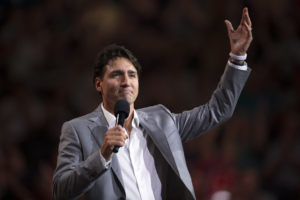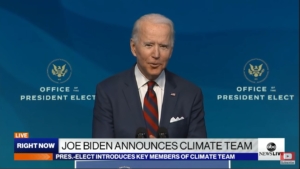Declaring an Opioid Emergency, Trudeau’s Art of the Deal, and Will AI Crown a “Ruler of the World”?
Here’s What You Need To Know
In late July, the President’s Commission on Combating Drug Addiction and the Opioid Crisis, led by New Jersey Governor Chris Christie, issued a preliminary report recommending, among other steps, that President Trump declare the opioid abuse epidemic as a national emergency. A couple weeks later, President Trump stated he was likely to do so. Although the President offered no additional details, his comments were widely interpreted as accepting this recommendation. However, over a month later, the President has yet to act and the Administration is still debating the proposal internally.
Declaring a national emergency would do little to change current policy by itself, but the move would provide various members of the executive branch with new powers under either the Public Health Service Act or the Stafford Act (which governs federal disaster response efforts) that could be used at their discretion. Many in the media are presenting this action as a no-brainer, but is it actually a good idea?
Here are the main arguments for declaring a national emergency:
Subscribe to Receive Insights
"*" indicates required fields
- It Would Allow The Administration To Free Up Greater Resources: Current law limits the extent to which the Federal Emergency Management Agency (FEMA) and the Department of Health and Human Services (HHS) can redeploy its budget and personnel to help tackle this issue. In addition, Medicaid restricts at what hospitals some drug users can receive treatment. Declaring an emergency would allow the President to authorize FEMA to direct some of its budget towards the crisis, while letting HHS Secretary Price redeploy public health workers to serve addicted populations and waive these Medicaid rules.
- It Would Allow The Administration To Increase Access To Critical Medications: Currently, patients must have a prescription to access a drug called naloxone that can reverse overdoses. In addition, doctors must have special certifications to prescribe drugs like methadone and buprenorphine, which help reduce cravings and withdrawal symptoms. Under a national emergency, the HHS Secretary would have the authority to waive restrictions for patients and doctors on these types of drugs.
- It Would Increase Pressure On Congress To Act: Last year, lawmakers passed a bill to expand funding for opioid programs, but only included half the money President Obama requested. The commission argues that if President Trump declares a national emergency, Congress will also want to show it is taking action, forcing them to “focus on funding and empowering the executive branch even further.”
Here are the main arguments against declaring a national emergency:
- It Would Divert Resources From Other Priorities: Money taken out of FEMA’s budget would have to be taken from other important areas, such as FEMA’s disaster relief fund. As Hurricane Harvey and Irma have shown, it is difficult to anticipate when major disasters will strike and depleting these funds could make it more difficult to respond when these events happen. Redeploying public aid workers would also remove these workers from other critical work, such as AIDS outreach.
- It Would Lead To An Unnecessary Expansion Of Executive Power: Emergency declarations have historically been used to tackle temporary problems that are contained within a specific place like hurricanes, earthquakes, and the Zika virus. In contrast, the opioid crisis is spread across the entire country and likely will never be completely eradicated. Doing so in this case could establish a new precedent where presidents feel compelled to declare emergencies in response to every problem. The result would be to permanently give the President powers that were designed to only be temporary.
- It Would Create A False Sense Of Action: Declaring an emergency may sound bold, but the funds it would free up would only be a small Band-Aid relative to the scale of the problem. FEMA’s Public Health Emergency Fund has an annual budget of only $45 million; in comparison, the 2016 21st Century Cures Act allocated $1 billion over two years to the problem of opioids. If the public views a national emergency declaration as sufficient, it could undermine the urgency for further legislative action.
News You Can Use
TRUDEAU’S ART OF THE DEAL
President Trump has repeatedly attacked the North American Free Trade Agreement (NAFTA) as creating an uneven playing field for American workers. Now Canada seems to be flipping the script on him. As part of the second round of NAFTA renegotiations in Mexico City earlier this month, Prime Minister Trudeau’s government argued right-to-work laws in 28 U.S. states are putting unionized Canadian workers at an unfair disadvantage, pushing the Trump Administration to pass legislation nullifying them.
Canada likely understands the improbability of a Republican Congress doing so, or these states allowing such an agreement, and is attempting to create leverage for other issues like quotas for U.S. dairy products and environmental standards by making a demand Trump cannot possibly fulfill. This development shows that renegotiating trade deals are not just an opportunity for the U.S. to improve its economic standing, but also opens the door for partners to extract concessions as well.
MAKING CRYPTOCURRENCIES LESS CRYPTO
Initial coin offerings (ICOs) to raise funds for cryptocurrencies like bitcoin have grown dramatically in recent years, and governments have begun to express concerns over their use for money laundering and terrorist financing. Last week, China’s central bank announced it was suspending ICOs until the government could develop a regulatory framework for the market.
This decision follows an SEC ruling in July that classified cryptocurrencies as securities, opening the door to criminal charges for anyone holding unregistered offerings. In addition, Singapore’s central bank recently issued a warning about the dangers of ICOs, while Russian authorities made arrests for the first time over the exchange of bitcoin into rubles. With governments cracking down on the market, look for increased calls for international cooperation to develop a common global regulatory framework on this issue.
OUR SELF-FULFILLING GROWTH STAGNATION?
Conventional wisdom since the 2008 financial crisis has insisted that a 3 percent growth rate for the United States is unrealistic. Yet, former Senate Banking Chairman and economist Phil Gramm and US Policy Metrics’ Michael Solon argue that if we lost 3% growth, we lost it for the first time only very recently, noting “America enjoyed 3% growth for so long it’s practically become our national birthright.”
When you retrace our steps, Gramm and Solon suggest, you will find a growth slowdown attributable to an Obama-era “tidal wave of new rules and regulations across health care, financial services, energy and manufacturing [that] forced companies to spend billions on new capital and labor that served government and not consumers,” all of which can be reversed. In addition, although the country is aging, the number of working-age Americans dropping out of the labor market has been the major driver of the declining workforce participation rate. If their argument is correct, the greatest risk to the U.S. economy may be that the status quo is accepted as the new normal and becomes self-fulfilling.
TESLA EXPOSED
Florida Tesla owners in the path of Hurricane Irma who had opted for a 60 kilowatt hour battery option instead of the longer range 75 kilowatt battery option (which costs thousands of dollars more) got a happy surprise as they evacuated: Tesla remotely extended the battery range of their vehicles to help them reach safety. While the company was praised for unlocking the additional battery range, it also raised serious questions. T
he cars these customers had purchased could always have gone that extra distance, because regardless of which battery option customers purchased, Tesla gave them a battery capable of 75 kilowatt hours anyways, but used software to prevent those paying for a 60 kWh version from using the extra storage their car’s battery possessed. With the lines increasingly being blurred between hardware and software, particularly on something as impactful as a means of transportation, Tesla’s business practice could bring increased regulatory scrutiny and potential reputational challenges that will have effects on other industries utilizing “smart” technologies that are artificially limited for those who cannot afford the higher price tag.
WILL A.I. CROWN A “RULER OF THE WORLD”?
While Russia continues its military buildup in the Arctic, President Putin signaled yet another front where a resurgent Russia may challenge the West: Artificial Intelligence (AI). Speaking to a group of Russian students, Putin said, “Whoever becomes the leader in this sphere will become the ruler of the world.”
From automating cyberattacks that currently require dozens of highly skilled personnel, to further eroding trust through the forgery of audio and video material, to improving the precision of aerial drones, AI will be integral to the future of warfare for geopolitical adversaries like Russia and China. However, non-state actors like hackers are weaponizing AI as well. With most AI advances occurring in the private sector and academia, experts are proposing ways to apply AI to U.S. national security policy. However, it remains to be seen whether U.S. policymakers will take Putin’s comment seriously and ensure we are leveraging, protecting, and improving on the AI knowledge that already exists outside of government.



